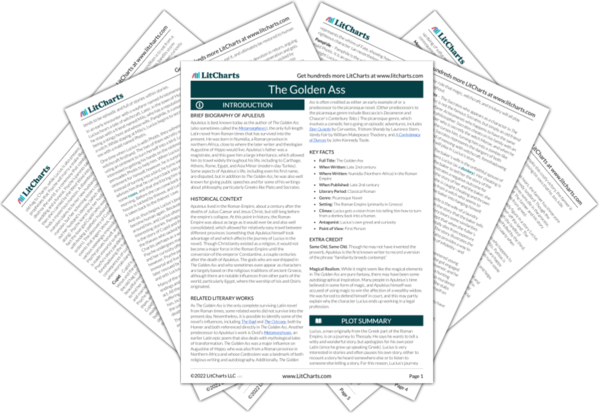Many of the stories in Apuleius’s The Golden Ass illustrate how greed often has consequences and can lead people to make bad decisions. The central conflict of the story—Lucius’s transformation into a donkey—is arguably caused by his greed to experiment with the witch Pamphile’s ointments and take some of her power as his own. Others face similar and even more direct consequences for greed, such as the thieves who rob Milo, only to be slaughtered themselves by Tlepolemus after they get too greedy and attempt a kidnapping—and Tlepolemus himself is later killed after claiming Milo’s goods from the thieves.
In fact, much of what Lucius suffers as a donkey is due to other people’s greed. He is whipped, burdened with heavy loads, and made to do arduous work, all so that others can attempt to increase their own wealth. In the final book, Lucius learns from his suffering and puts aside his own interests in order to better serve the interests of the gods Isis and Osiris, suggesting that it’s possible for selfish individuals to renounce their old ways and embrace more selfless, meaningful lifestyles. Although many of the characters in The Golden Ass face terrible fates as a result of their lack of generosity, then, Lucius’s journey shows that there are still opportunities in life for greedy people to change for the better.
Consequences of Greed ThemeTracker

Consequences of Greed Quotes in The Golden Ass
Okay, let me weave together various sorts of tales, using the Milesian mode as a loom, if you will. Witty and dulcet tones are going to stroke your too-kind ears—as long as you don't turn a spurning nose up at an Egyptian papyrus scrawled over with an acute pen from the Nile. I’ll make you wonder at human forms and fortunes transfigured, torn apart but then mended back into their original state.

Unlock explanations and citation info for this and every other The Golden Ass quote.
Plus so much more...
Get LitCharts A+My dinner had consisted entirely of my own reports, so I was weighed down by weariness, not food, as I returned to my bedroom and surrendered to the repose I yearned for.
Well, I was a curious person. The moment I heard the word witchcraft, representing my lifelong aspiration, I shrugged off any need to play it safe with Pamphile.
“It’s true what you say,” I replied. “I don’t think I’ve felt freer anywhere else in the world. But I’m really scared of the black-magic profession lurking in obscure holes here—there would be no chance of spotting the places, and then no chance of getting away.”
Helplessly surveying this new body, I saw I was not a bird but a donkey. I wanted to complain to Photis, but human voice and gesture had been taken from me.
But the instant the lamp elucidated the secrets of the bed to which she brought it, she saw the sweetest beast, the gentlest wild thing in the world, Cupid himself, that gorgeous god, at gorgeous rest.
Leave off your troublesome weeping and your wailing so alien to my brave deeds. I have taken revenge on the gore-caked annihilator of my husband.
Here, I remember, the greatest peril to my life was played out.
At last, both tasks were completed, and the workman, beset by all misfortunes, had to carry the jar all the way to where the man who cuckolded him was staying.
As the baker reviewed these indignities, his spouse, for whom insouciant arrogance was by this time second nature, called down curses on the fuller’s wife in the most hateful terms.
But the rich man’s mind was completely gone. He wasn’t the least bit intimidated, or even distracted, by the presence of so many fellow citizens.
The slaves were brothers, and their master was quite a rich man. One of them was a pastry chef, who stylized breads and honeyed edibles; the other was a cook who flavored chunks of meat with succulent rubs and juices and tenderized them over the fire.
But these fine—in fact excellent—arrangements, made with the purest intentions, couldn’t hide from Fortune, whose will was death. She prodded cruel Jealousy to head straight for the young man’s house.











